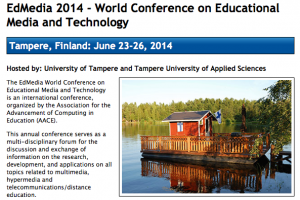News Story
Learning Analytics keynote at World Conference on Educational Media
Friday 27 Jun 2014
I’ve just returned from EdMedia 2014 [#edmediaconf] where I was honoured to be invited to present as a keynote speaker. My thanks to the AACE organisers and delegates for the very warm welcome I received.
The critical stance of the talk seemed to resonate with delegates, who hear a lot about “Big Data” and analytics, but have reservations about the kinds of learning that such technologies may perpetuate. I sought to deconstruct analytics to clarify the ways in which an approach and how it is used embodies an educational worldview. Knowing this, what kinds of learners are needed for 21st century society, and what role can analytics play in advancing this mission?
Abstract: Education is about to experience a data tsunami from online trace data (VLEs; MOOCs; Quantified Self) integrated with conventional educational datasets. This requires new kinds of analytics to make sense of this new resource, which in turn asks us to reflect deeply on what kinds of learning we value. We can choose to know more than ever about learners and teachers, but like any modelling technology or accounting system, analytics do not passively describe sociotechnical reality: they begin to shape it. What realities do we want analytics to perpetuate, or bring into being? Can we talk about analytics in the same breath as the deepest values that a wholistic educational experience should nurture? Could analytics become an ally for those who want to shift assessment regimes towards valuing the qualities that many now regard as critical to thriving in the ‘age of complexity’?
Bio: Simon Buckingham Shum is Professor of Learning Informatics at the Open University’s Knowledge Media Institute, where he is also Associate Director (Technology), overseeing knowledge and technology transfer to the OU. He researches, teaches and consults on Learning Analytics, Collective Intelligence and Argument Visualization. He co-edited Visualizing Argumentation (Springer 2003) followed by Knowledge Cartography (2008, 2nd Edition 2014). He served as Program Co-Chair of the 2nd International Learning Analytics conference, chaired the LAK13 Discourse-Centric Learning Analytics workshop, and the LASI13 Dispositional Learning Analytics workshop. He is a co-founder of the Society for Learning Analytics Research, Compendium Institute and and Learning Emergence. In August 2014, he joins the University of Technology Sydney as director of the new Connected Intelligence Centre. WWW: simon.buckinghamshum.net


Latest News
Assessing the Impact of Artificial Intelligence on the Gender Pay Gap
PhD Awarded for Groundbreaking Research on Game-Based Cyber Security Training
KMi at the Palace of Westminster: Exploring Blockchain for Society and Economy
OUAnalyse at the Digital Ethics Summit 2025: Advancing Responsible AI in Education

